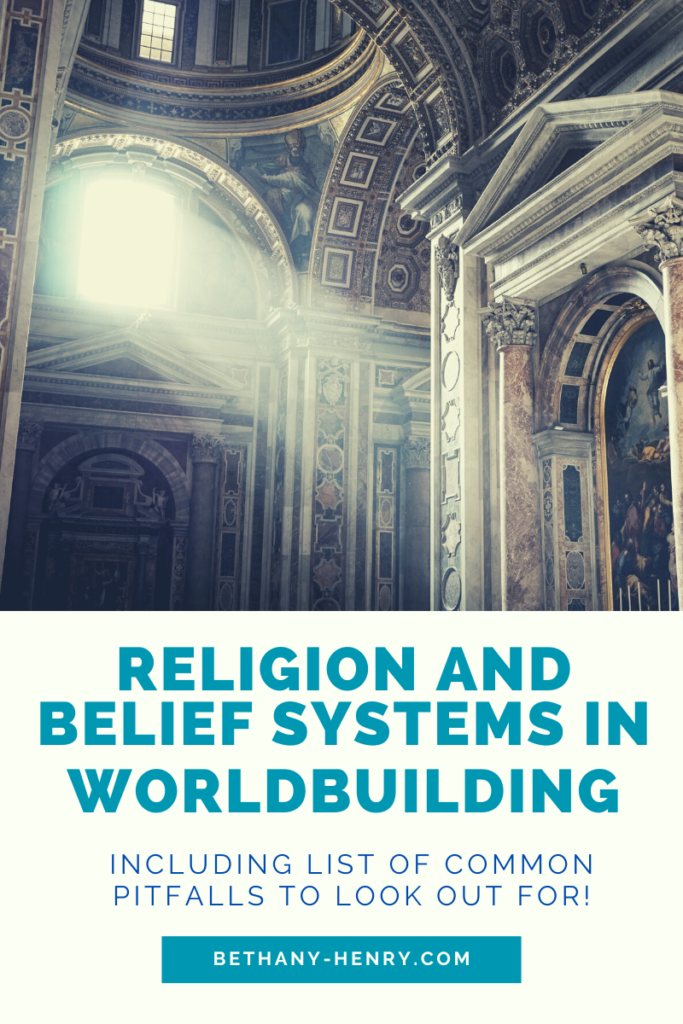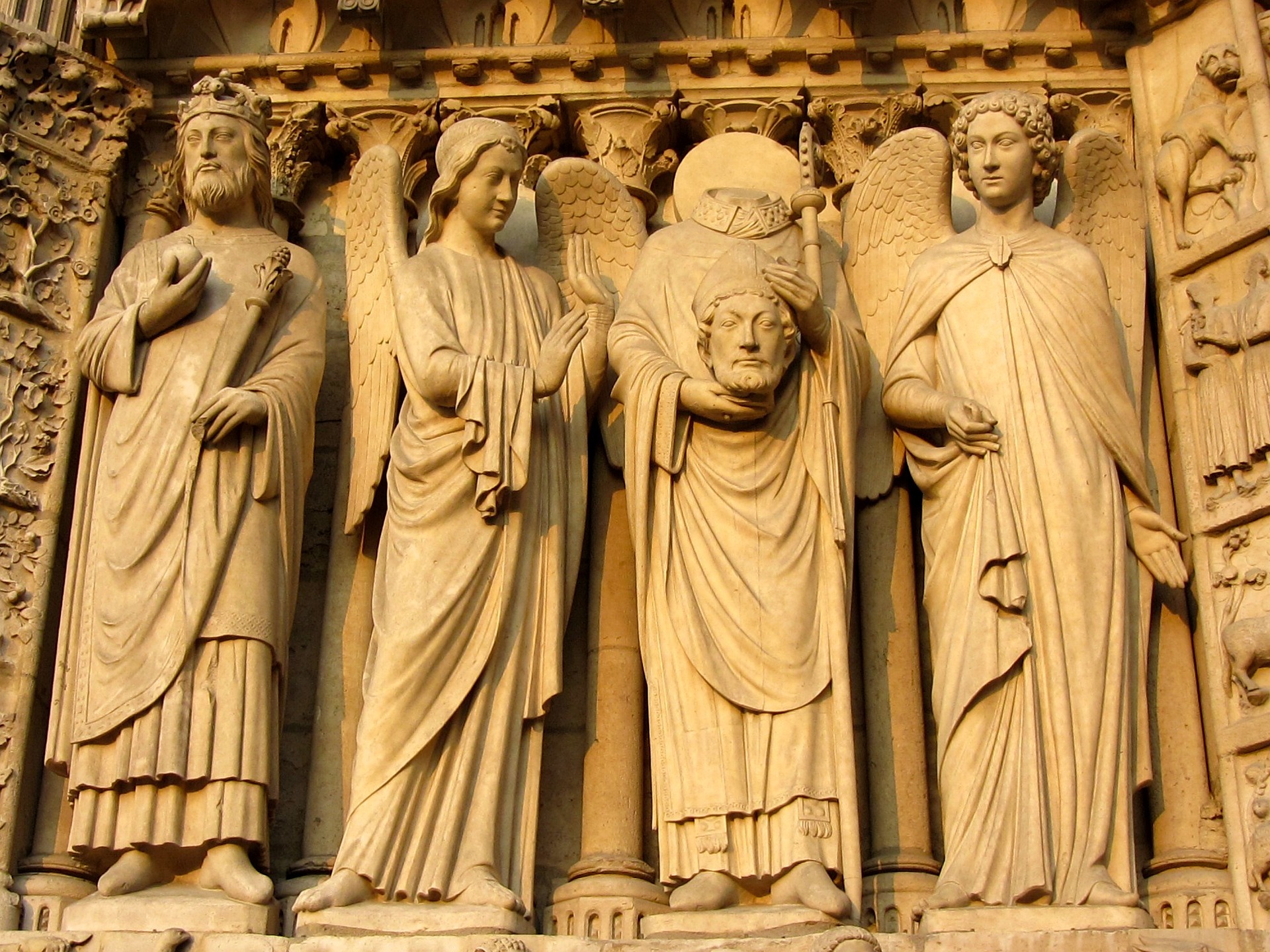
Last month we spent some time discussing worldbuilding, specifically how having an overall theme can tie our worldbuilding concepts together and looking at how including specific details can provide depth.
(Go back and check it out if you missed it!)
Today we’re looking at worldbuilding a bit more as we focus on religion and belief systems. We’ll go over the importance of belief systems, strategies for including them in our worldbuilding, and common pitfalls to watch out for.
But first: What is a belief system?
A belief system is defined as “a set of principles or tenets which together form the basis of a religion, philosophy, or moral code.”
Sound simple enough? Basically, it’s whatever point of view a person is coming from and how they see the world.
Beyond any individual’s personal beliefs, most cultures contain several established religions or widespread systems of philosophy. These include beliefs and stories surrounding the start of life/creation, concepts of good and evil, and how people understand life and death.
These beliefs shape underlying and often subconscious values of a culture and they influence cultural practices such as (but in no way limited to!) language, holidays, and funeral rites.
Why to include belief systems in our worldbuilding
Because different established belief systems are so widespread in different forms throughout the world, including them to some degree in our worldbuilding is realistic. They can also add depth to our worlds and make them more interesting.
The inclusion of belief systems in our writing can add tension to our story since not everyone believes the same things or agrees how these beliefs should be practiced. It can also raise the stakes in our story, for instance if a character’s faith is challenged or their religion is otherwise intertwined with the story’s conflict.
We can add backstory to a culture or for a specific character when we show how they have been shaped by various religious practices. And we can demonstrate character development and growth through the changes in their belief systems and values.
However! Note that you don’t *have* to include religion in your worldbuilding. Plenty of stories don’t, and so long as your world is fleshed out in other areas you don’t need to worry about it. It’s just something to consider!
Strategies for including belief systems in our worldbuilding
1- Brainstorm Story Needs
How big a part do you want religion and belief systems to play in your story? Remember, it doesn’t need to be overly complicated or a big plot point unless you want it to!
2- Theme
How does your religion and belief system fit with your world? Just like with your overall worlbuilding, if your religion has a theme to tie it together it will seem like a more cohesive whole.
3- Borrow From Reality
We don’t need to start from scratch! There are plenty of religions and belief systems in the world that can inspire our worldbuilding.
Learning more about religious doctrine, staunchly non-religious beliefs, and faith practices everywhere in between can all help us better understand the diversity and nuances of how various philosophies plays out in reality.
Note that this does not mean we should just rip off an existing religion, give everything new names, and call it done! While we can gain inspiration from various cultures and existing philosophies, we don’t want to just be perpetuating stereotypes. (See common pitfalls below!)
4- The Checklist!
There are common elements that many belief systems share. Our writing isn’t required to address each of these elements but it can give us a good foundation to use as a starting point!
- Highest value
What does this belief system prioritize? For example, Logic? Ruthlessness? Economy? Compassion? Art? - Relation to nature and harvest
Is a divine being or beings responsible for the harvest? For example, do plants and animals have spirits? What does humans connection to nature look like? - Creation
What are the creation stories and myths of this religion? For example, is there a creator god or gods? Is the earth a product of evolution? Where did humans (or your given fantasy/sci-fi race) come from? - Birth/Death
What attitudes and beliefs surround life and death? What rituals, superstitions, and ceremonies surround these events? - Celebrate!
What special days are celebrated in your world? What foods, clothes, and festivals might be used to mark occasions? Are there superstitions and rituals tied to these events? - Diversity
How are different races, classes, disabilities, genders, and sexualities viewed in this belief system? - Division
What different factions or sects are there within your religion? Are there multiple religions or belief systems in the world (such as in real life!) that are competing for attention? What points do people disagree over?
Avoiding Common pitfalls
Including belief systems in our stories is a tricky thing. We don’t want to offend anyone, exclude anyone, or mess it up! And yet we don’t want to just avoid the topic altogether.
Because this is a sensitive and personal area, we want to be extra careful to be doing our very best to treat people with kindness and respect, even when we may disagree with them. (Especially then!)
Here are a few things to keep in mind:
1- Don’t be preachy
There are times and places to get up on your soapbox and give a passionate message about something you care about! But your novel isn’t necessarily one of them.
That isn’t to say we can’t share our values in our writing. Stories shape the world!
But we need to allow our stories to be just that: stories. Not sermons.
TIP: Get feedback on your novel from someone who has a different worldview than your own! They will be much more likely to pick up on areas where your writing may be too heavy-handed or biased. We don’t need to remove our own opinions from our work, but we do want it to be adding to the story as a whole instead of detracting from it.
2- Don’t be stereotypical
When including religion in our stories we need to be especially careful that we aren’t reflecting stereotypes with our writing. For example, the stingy Jew, the terrorist Muslim, or the redneck Christian.
Even “positive” stereotypes can still be harmful since they reduce an individual to a more flat caricature and place unfair expectations on their shoulders.
Fantasy races or religions are often tied to real-life equivalents! Regardless of the names, colors, or shapes of our characters and belief systems, stereotypes can often creep in without us noticing.
Our goal should be to create well rounded characters and treating everyone with respect.
TIP: Doing abundant research can help us recognize the stereotype assumptions we may hold subconsciously so we don’t accidentally put them in our stories. And as always, feedback is invaluable!
3- Don’t be simplistic
Life isn’t black and white and we shouldn’t pretend otherwise!
If we portray a certain religion as faultless and wholly good, readers will recognize this as fake. Each belief system is made up of individuals, each with their own strengths and weaknesses, successes and mistakes. People have doubts and issues they disagree on. Characters can change their minds.
These complex, gray-areas of belief systems are honest and we should reflect that in our writing.
In Closing…
Portraying belief systems in our writing can be a powerful way to deepen our stories and our worldbuilding.
Yet what people believe and how they practice is a complex and often sensitive subject.
We need to be intentional in how we include these topics in our writing and we need to make sure we are getting feedback in order to ensure our stories are the best they can be.
For further reading:
Mythcreants – Creating Religions and Belief Systems
Richie Billings- Religion In Fantasy




